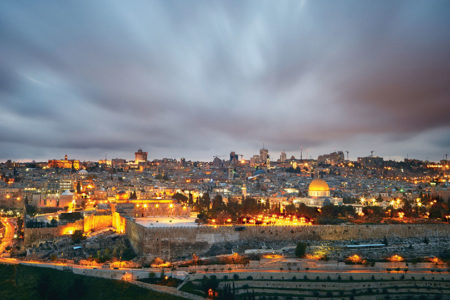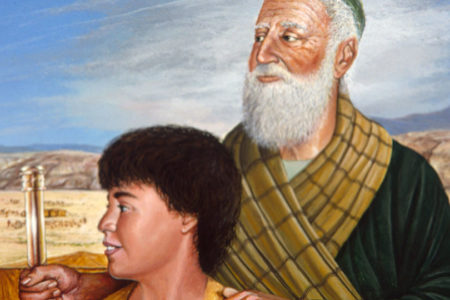Interpretations and Beliefs of Christian Reconstructionism
Introduction
Our previous article noted that the heart of Christian Reconstructionism (also known as Dominion Theology and Theonomy) is a postmillennial view of history. According to this view, at the time of creation God gave man an eternally binding cultural-dominion mandate to subdue the earth on behalf of God and thereby establish the Kingdom of God on this planet. As a result of his fall, Adam failed to fulfill this covenant mandate, and Satan began to dominate many things in the world.
Israel and the Gentile nations of Old Testament times failed to fulfill the mandate, for Israel disobeyed and the Gentiles did not adopt the Mosaic Law, which was God’s fullest revelation and greatest means of execution of the dominion mandate.
During His First Coming, Jesus Christ established and restored the Mosaic Law to full measure as the rule of life for the entire world, defeated and bound Satan, and established the Kingdom of God in a definitive way.
Although that Kingdom has been established, it has not yet been developed fully in the world. During this present age, Christ develops the Kingdom of God through the faithful obedience of the Church to the dominion mandate. Before the history of this earth ends, the Church will Christianize the entire world by bringing every nation, institution, individual, and culture under the rule of Christ through subjection to the Mosaic Law.
Once the entire world has been brought under Christ’s rule, the Kingdom of God will have been developed fully and finally on earth. Then Christ will return in His Second Coming on the last day to receive His Kingdom.
This postmillennial view of history has prompted Reconstructionists to adopt some interesting beliefs and interpretations of the Scriptures. This article presents some of these interpretations and beliefs.
Authority
Some Reconstructionists imply that the Scriptures by themselves are not sufficient as final authority for faith and practice. One individual indicates that there is a twofold authority, namely, the Bible and theology. A fellow Reconstructionist, realizing the serious implications of this approach, issued the following warning: If our theology is allowed, in any measure, to regulate how the Scriptures are handled, then humanistic dross is inserted into the pure Word of God. Do we want some sort of Protestant magisterium? God forbid! Theology must never regulate Scripture. Scripture must regulate theology.
Other Reconstructionists appeal to “the voice of mother church,” in addition to the Scriptures, as authority for their views. One such person “admonishes his listeners to decide biblical matters not just from the text of Scripture alone (our ‘father’) but to also listen to the voice of our ‘mother’—church tradition.”
Eschatology
Reconstructionism is strongly opposed to Dispensationalism. Reconstructionism asserts that God intends the Mosaic Law to be in effect throughout history. By contrast, Dispensationalism teaches that the Mosaic Law was abolished when Christ died. In light of this contrast, Reconstructionists declare that Dispensationalism is antagonistic to the Law of God, is at war against the law-order that the Church is to be establishing in society today, is characterized by unbelief, and is a heresy.
Reconstructionism is also anti-premillennial. Some Reconstructionists call Premillennialism “heresy.” One writer accuses Premillennialism of leading to the “Pharisaism which crucified Christ and which masqueraded, as it still does, as the epitome of godliness. There can be no compromise with this vicious heresy.”
Another writes,
The notion that the reign of Christ is something wholly future, to be brought in by some great social cataclysm, is not a Christian doctrine. It is an unorthodox teaching, generally espoused by heretical sects on the fringes of the Christian Church.
Reconstructionism accuses Premillennialism of defeatism (seeing no victorious end to history), of regarding the history of the Church as irrelevant, of draining believers of the motivation to develop the Kingdom of God on earth, and of being a product of paganism.
Reconstructionism is opposed to the pretribulation Rapture doctrine. One reconstructionist declares,
The modern doctrine of the “Rapture” is too often a doctrine of flight from the world, in which Christians are taught to long for escape from the world and its problems, rather than for what God’s Word promises us: Dominion … A good deal of modern Rapturism should be recognized for what it really is: a dangerous error that is teaching God’s people to expect defeat instead of victory.
Reconstructionism rejects the idea that the Rapture and the Second Coming will be two separate events at different times. It insists that the Church will be raptured to meet Christ in the air while He is descending to earth in His glorious Second Coming on the last day of world history.
Reconstructionists deny the imminency of the Lord’s return. They insist that Christ cannot return for at least a thousand years, until after the Church has fully developed the Kingdom of God on earth. They believe that the present expectation of Christ’s coming is a hindrance to the development of the Kingdom in this age.
Reconstructionists are convinced that the great majority of New Testament prophecies, including most of the Book of the Revelation, have already been fulfilled. In fact, they believe that most of these prophecies were fulfilled by the destruction of Jerusalem in 70 A.D. This belief has led to the following Reconstructionist conclusions: The expression the last days is a reference to the last days of God’s program for Israel as a nation. It involves the period of time from the First Coming of Christ to the cessation of national Israel with the destruction of Jerusalem in 70 A.D. The great apostasy (mentioned by Paul in 2 Th. 2) and the Antichrist both refer to the widespread apostasy of the Church before the fall of Jerusalem in 70 A.D. The Antichrist is not some future world ruler. The beast of Revelation is a symbol of Nero and the ancient Roman Empire. The false prophet of Revelation is the ungodly leaders of Israel who rejected Christ and worshiped the beast. The great harlot of Revelation is the apostate city of Jerusalem, which rejected God’s message and messengers. The “abomination of desolation” (Mt. 24:15) refers to the armed invasion of Jerusalem, and the “great tribulation” (Mt. 24:21) transpired when Israel fell as a nation in 70 A.D. Armageddon is not a literal battle. Instead, it is a symbol of the defeat and destruction of all who oppose God. The first resurrection of Revelation 20:5 is a spiritual, not a physical, resurrection, namely, the justification and regeneration of believers. The thousand years of Revelation 20 are to be understood symbolically (not literally) as a huge, undefined period of time. The Millennium is the Kingdom of God that Christ established on the earth during His First Coming it is also the period of time between the First and Second Comings of Christ (the time when the Church is fully developing the Kingdom in the world).
A new heaven and new earth are descriptive of the believer’s salvation, both now and in eternity. The new Jerusalem is the Church, both now and throughout eternity.
Some Reconstructionists claim that orthodox Christianity has always been postmillennial, or at least mainly postmillennial, in its eschatology.
Matthew 24, The Revelation, and the 70 Weeks of Daniel
Reconstructionists teach that Matthew 24 and the Book of the Revelation are not about the Second Coming of Christ. Instead, they are prophecies about the 70 A.D. destruction of Jerusalem and Israel as a national entity.
One writer asserts the following things concerning Matthew 24: The “abomination of desolation” (v. 15) is the armed invasion of Jerusalem in 70 A.D. The cosmic disturbances (v. 29) happened poetically (not literally) in 70 A.D. This was Matthew’s figurative way of saying that the lights went out for the wicked when Jerusalem and Israel were destroyed. Christ’s coming (v. 30) was a coming in divine judgment upon Jerusalem and Israel in 70 A.D. In verse 30 Matthew used Zechariah 12:10 totally out of context. Zechariah referred to the conversion of Jews at the Second Coming of Christ, but Matthew used it to refer to the agony and terror that the Jews would experience when visited by Christ’s judgment upon Jerusalem and Israel in 70 A.D. “This generation” that would not “pass, till all these things be fulfilled” (v. 34) is the generation that was living in Christ’s day, the 40-year generation from Christ’s ascension (30 A.D.) to the destruction of Jerusalem (70 A.D.). The preaching of the gospel of the Kingdom “in all the world for a witness unto all nations” (v. 14) was fulfilled before 70 A.D.
The same Reconstructionist declares that the word coming in Revelation never refers to the physical return of Christ to the earth at His Second Coming. Even Revelation 19 is not presenting the Second Coming. Instead, it is referring to the spread of the gospel throughout the world as it is proclaimed during the time between the First and Second Comings. Indeed, some Reconstructionists insist that most biblical references to Christ’s coming are to periodic comings of divine judgment upon people and nations during this present age.
Since Reconstructionists claim that the Book of the Revelation is presenting prophecies about the 70 A.D. destruction of Jerusalem and Israel, rather than prophecies relating to the Second Coming of Christ, they insist that Revelation was written before 70 A.D. Their view requires them to insist upon this. In order for a book to present prophecies about a future event, it must be written before that event. Indeed, Reconstructionists assert that the whole canon of New Testament Scripture was completed during Nero’s reign before 70 A.D.
Reconstructionists also claim that all 70 weeks of Daniel 9 were completed by 70 A.D.
Economics
Some Reconstructionists are convinced of the eventual collapse of the American economy and the social breakdown of the American republic. They believe that when this collapse of the present apostate civilization takes place, the Kingdom of God can be developed in the world by the remnant that survives the collapse through the adoption of a medieval, feudalistic type of economy and lifestyle. It was through this type of economy and lifestyle that European civilization was rebuilt after the collapse of the ancient Roman Empire. Reconstructionists believe that this approach would fit well with the theonomy way of life proposed by them.
Democracy
Some Reconstructionists assert that a democracy in which ultimate authority resides in the whim of the people is the inevitable enemy of divinely revealed Christianity. This pluralistic approach to government leads to the denial of absolute truth, values, and moral standards; therefore, it is totally contrary to the theonomy way of life, in which the divinely revealed Mosaic Law subjects every nation, institution, culture, and person to the rule of its moral absolutes. Democracy is a form of paganism.
Humanism and Public Education
Reconstructionists believe that humanism and God’s law are irreconcilable enemies. The modern state is dominated primarily by humanists, who use the state to enforce satanic control over other spheres of life. God’s law favors private property rights; but the humanistic state favors socialism. God’s law requires decentralization of authority, in which each sphere of society (family, Church, government) bears responsibility within itself to carry out its proper functions; but the humanistic state eagerly pursues centralization of authority within the government. God’s law promotes private Christian philanthropy through the giving of the tithe; but the humanistic state develops a government-controlled welfare system. God’s law requires sanctity of human life, the God-ordained use of sexuality, and biblical faith; but the humanistic state supports such perversions as abortion, homosexuality, and the repression of biblical Christianity. God’s law ordains only four legitimate roles for government: (1) the restraint of civil evil, (2) the punishment of civil evil, (3) the protection of law-abiding citizens, and (4) the defense of the nation; but the humanistic state assumes a far greater function than these four roles. It seeks to usurp to itself the authority that God’s law delegates to the other spheres of life. It believes it must do this in order to bang in a manmade, utopian kingdom.
Reconstructionists are convinced that God’s law delegates ultimate responsibility for the education of children to the family and, to some extent, the institutional church. They view the establishment of government-operated and enforced public schools as an illegitimate, antibiblical encroachment of the state upon the sphere of parents and, to some extent, the sphere of the institutional church. The public school is a tool used by the humanistic state to persistently and earnestly shape the thinking of children in line with its goal of establishing a man-made, utopian kingdom.
The Mosaic Law and Sanctification
Reconstructionists strongly reject the idea that the Mosaic Law was abolished when Christ died. Instead of Christ’s death abolishing the Law, it enabled man to keep the Law. They insist that God requires all nations, institutions, cultures, and individuals to be subject to the civil and moral aspects of the Mosaic Law. They believe that all the blessings for obedience to the Law and curses for disobedience, which God pronounced upon Israel in Deuteronomy 28, are still in effect today for all nations, institutions, cultures, and individuals.
Reconstructionists are convinced that there are only two alternatives open to nations, institutions, cultures, and individuals—obedience to the Mosaic Law or humanistic self-rule and lawlessness.
According to Reconstructionists, Christians are dead to the Mosaic Law as the means of justification, but they are not dead to it as a rule of life. For the Christian, obedience to the Mosaic Law is required for practical living. Keeping the Law is the Christian’s means of sanctification.
Evangelism and the Gospel
Reconstructionists propose the following view of evangelism:
Personal redemption is not the do-all and end-all of the Great Commission. Thus, our evangelism must include sociology as well as salvation; it must include reform and redemption, culture and conversion, a new social order as well as a new birth, a revolution as well as a regeneration. Any other kind of evangelism is shortsighted and woefully impotent. Any other kind of evangelism fails to live up to the high call of the Great Commission.
This is the Reconstructionist way of saying that true evangelism includes the Christianization of culture worldwide. This view of evangelism has affected the Reconstructionist understanding of the content of the gospel. One spokesman has declared, “Reformation means to proclaim the saving power of Christ, and to apply the whole word of God to every area of life. Anything short of that is not the Gospel.”
Romans 8:19–23
In Romans 8:19–23 Paul talks about nature groaning and travailing in pain while enslaved to the corruption that is the result of the curse that God placed upon it at the fall of man. Paul indicates that nature can hardly wait until the manifestation of the sons of God when the curse will be lifted and nature will be freed from its bondage to corruption.
Instead of believing that Paul is referring to a particular event that God will cause through His direct intervention at one specific point of time in the future, Reconstructionists interpret Romans 8:19–23 as follows: Paul is referring to a process, the process of Christians progressively Christianizing the world until they have subjected everything to God’s rule. The curse of sin and death is removed progressively as Christians proclaim the gospel to more and more people. Nature can hardly wait for this progressive removal of the curse to be completed when the Church finally fulfills the cultural or dominion mandate to subdue the earth on behalf of God and thereby totally develops the Kingdom of God on earth.
The next article will present an evaluation of Reconstructionism.
Author’s Note: The information in this article has been derived from the following book: Dominion Theology: Blessing or Curse? by H. Wayne House and Thomas D. Ice, copyright 1988 by H. Wayne House and Thomas D. Ice. Published by Multnomah Press, Portland, Oregon 97266. Used by permission. This book is an excellent, thorough examination and critique of the Christian Reconstruction movement. It is highly recommended.








